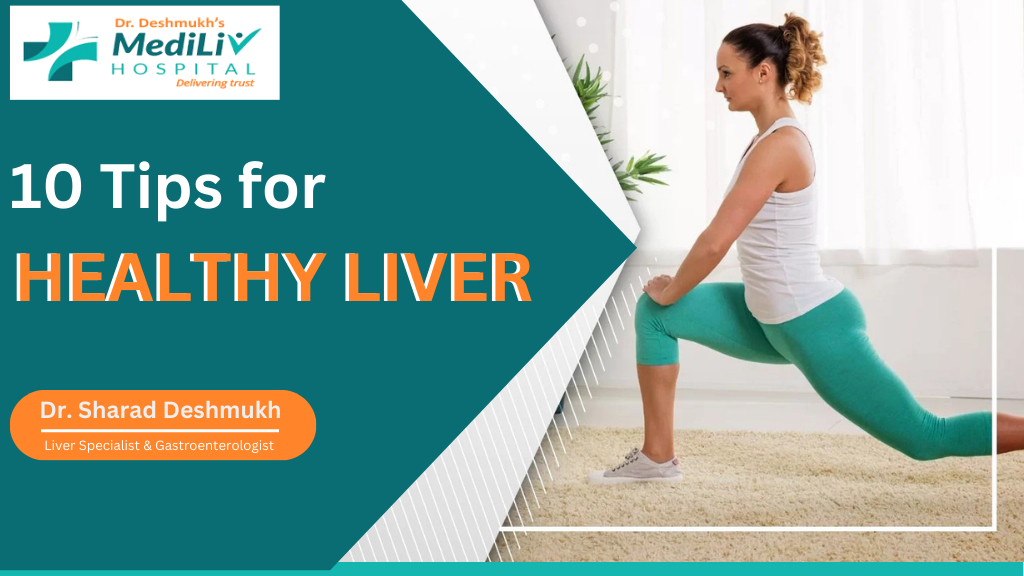Getting vaccination against viral liver diseases like Hepatitis A and B is one way to keep the health of your liver. More advice for a healthy liver is provided by the Dr. Sharad Deshmukh the gastroenterologist, Intestinal, Liver, Liver, Gall Bladder, and Pancreatic and Liver Transplant Surgery.
Limit Your Alcohol Intake and Drink in Moderation
Only a small amount of alcohol can be recycled or broken down by our liver every hour. Beyond this, it may harm liver cells, cause inflammation, and cause scarring (cirrhosis).
For this reason, women should only have one standard drink per day while males should limit their alcohol intake to two.
1.A Standard Drink Is Original To:
- one ordinary beer
- one small glass of wine or
- a small shot of whiskey
2.Regular Exercise and Have an Active Life
An active lifestyle is essential for a healthy liver. Exercise helps to reduce obesity, a risk factor for liver disease, boosts energy levels, and relieves liver stress. Try for 150 total minutes of activity per week, such as brisk walking or swimming.
3.Have a Balanced and Healthy Diet less Fatty Foods and Further Fibre
Fatty liver disease is frequently brought on by excessive blood fat (hyperlipidemia) and cholesterol levels (hypercholesterolemia).
Reduce the amount of saturated, Trans, and hydrogenated fats you consume.
Red meat, dairy products, and deep-fried foods all include saturated fats. Reused foods contain Trans and hydrogenated fats. The liver retains additional dietary fat, and an accumulation of fat can eventually result in fatty liver disease.
Increase your consumption of high-fiber foods including whole grains, fruits, and vegetables. Increase your intake of fish, white meat, beans, and almonds while reducing your consumption of red meat.
4.Watch Your Body Weight
Fatty liver disease is significantly increased by obesity, especially central or abdominal obesity. A healthy weight can be obtained and maintained with the help of a balanced diet and regular exercise.
Target your body mass index (BMI) at the ideal level.
5.Get Vaccinated
Get vaccinated against the viral liver diseases hepatitis A and B. Avoid eating raw or infected seafood or shellfish as hepatitis A is spread through contaminated food and water. Through sexual contact, tainted blood, and needles, hepatitis B can be transmitted. However, if you decide getting vaccinated against hepatitis B, indulge in safer sexual behavior. Consult your primary care physician about getting these doses.
6.Be Careful with Traditional Medicine and Remedies
Some of these over-the-counter traditional medicines or remedies contain heavy metals or unknown toxins. These may stress your liver and interfere with its normal operation or they may influence liver toxins.
Over-supplementing with conventional medicine may result in liver inflammation and irreversible liver damage or even liver failure. If in doubt, please get advice from a liver specialist before consuming.
7.Be Careful of Weight Loss Pills or Fad Diets
Without a prescription, over-the-counter weight-loss capsules may have toxins and other substances that are harmful to the liver. Fad diets that cause your weight to fluctuate drastically put a great deal of strain on your liver. Any diet that promises substantial weight loss in a surprisingly short period of time should be avoided. These diets usually lack necessary nutrients and aren’t good for your liver; instead, they may harm liver.
Be cautious when consuming detox and liver-cleansing diets. Contrary to popular perception, no specific diet has been shown to cleanse the liver. To help you in creating a healthy diet, kindly ask your doctor or dietitian.
8.Take Care and Cover Yourself against Hepatitis B or C
There is currently no vaccination against hepatitis C. When there is a risk of blood-to-blood contact or through sexual interaction, hepatitis C can be spread.
Avoid sharing toothbrushes, razors, needles, and other personal care products without need since they might spread hepatitis B or C. Indulge in safe sex.
If you have hepatitis B or C, talk to your doctor about a screening test to catch issues early. However, if either of your parents is a carrier or if you are unsure, be tested for hepatitis.
9.Take Care If You Have Diabetes, Hypertension And/ or High Cholesterol
Obesity, diabetes, high blood pressure, and high cholesterol combined produce the metabolic syndrome, which greatly increases the chance of developing fatty liver disease.
Liver damage can be prevented and reduced by managing your diabetes, high blood pressure, and high cholesterol by diet, exercise, and/or other particular measures. Please continue to visit your regular physician on a regular basis.
Some anti-cholesterol medications might occasionally produce liver issues as a side effect. Some medications can harm your liver if you consume alcohol while taking them or if you take many medications at once. If in doubt, discuss in details with your pharmacist or doctor.
10.Cut Down Smoking or Stop Smoking:
According to specific studies, smoking cigarettes increases the risk of developing liver cancer. Additionally, smoking can increase the disease effects of various substances (including paracetamol).
If you have more questions about food safety, consult a Liver specialist in Nashik
Dr. Sharad Deshmukh is a well-known and experienced Gastroenterologist in Nashik, Dr. Deshmukh has had vast experience in all areas of his field, having performed over 10,000 diagnostic and therapeutic upper GI endoscopies, and over 5,000 diagnostic/therapeutic colonoscopies and sigmoidoscopies..

